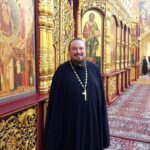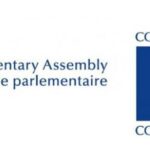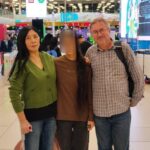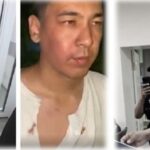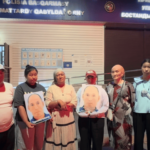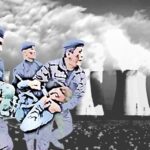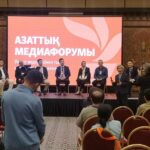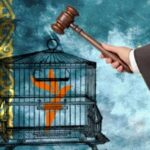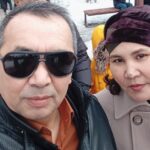As in other parts of the world, the number of internet users is quickly growing in the Central Asian countries. Between 2005 and 2011 the rate of internet users increased from 3 to 45% in
****
The recent conviction of
Access to websites containing information critical of authorities such as opposition news and resource sites are filtered, blocked or obstructed in other ways. Social networks, which have been increasingly used by the political opposition to communicate and spread the word about their actions, are a particular source of discontent on the side of those in power. President Nazarbaev has condemned social networks for “spreading lies and propagating violence and evil” and accused Western countries of using such networks to “push their values to other countries.”[6] A 2011 national information security concept deemed it a danger that social networks and blogs may be used to “influence” the political situation in the country.[7] Public officials have also advocated increased control of social networks and other online resources, e.g. through the creation of a “cyber police” in the framework of the Shanghai Cooperation Organization.[8] The popular blog and social networking site Live Journal was blocked by court as of mid-August 2011 for allegedly spreading “extremist” propaganda, although no evidence was presented to support this accusation and no previous request was made to the site administrators to remove the content in question. The site remained unavailable more or less uninterruptedly for more than a year before access was restored in connection with the Eurasian Media Forum held in Astana at the beginning of October 2012. Another social media site, Twitter, was blocked for several days in connection with the December 2011 events in Zhanaozen, as part of a broader information blockade that followed these events.
Those who organize and mobilize participation in anti-government protests, among others, over social networks continue to be subjected to intimidation and harassment. On several occasions this year, political and civil society activists involved in such efforts have received official “warnings” and/or been “preventively” arrested prior to protests. Anti-government protests are, as a rule, held without being sanctioned by authorities as applications are rejected on arbitrary grounds or actions only are allowed in remote locations outside city centers. In a typical pattern, these assemblies are dispersed and organizers and participants are detained, brought to court and given administrative penalties. Following a so-called Disagreement Day rally held in Almaty in April 2012, civil society activist Bakytjan Toregojina was sentenced to 15 days’ administrative arrest for using social media to organize this assembly, which she was not able to attend herself as she was arrested the same morning. Moreover, like other outspoken journalists, online journalists and bloggers who report in a critical manner about developments in
****
While the authorities of
The internet is offered in only a highly censored version to the small part of
When the Russian MTS cell phone company returned to Turkmenistan in August 2012 (after previously being expelled in 2010), there were hopes that this company would offer better quality and cheaper internet connections than the state-owned Altyn Asyr[11] and that it would facilitate access to internet resources blocked by the national provider[12]. However, so far MTS has not lived up to these expectations and the internet services it provides are also slow, costly and restricted.
The Turkmen authorities’ concerns about the internet as a means for challenging government propaganda were highlighted in connection with the July 2011 explosions at an ammunitions depot, when the attempts to cover up this accident were undermined by individual internet users who channelled first-hand information about it abroad. The Turkmen authorities denounced the alternative information as “slanderous”, sought to track down those who reported it and imprisoned a local RFE/RL contributor who blogged about the explosions (he was later released as a result of international pressure).
The Austria-based website of Turkmen Initiative for Human Rights (TIHR) was also hacked when it was covering the
****
As independent journalists and human rights defenders continue to be prosecuted and imprisoned, human rights NGOs denied registration and human rights pickets routinely broken up by police, internet users in
Uzbek government officials have publicly warned of ”destructive” and “provocative” forces in the internet, and state propaganda has particularly targeted global social networks, which are increasingly used by exiled opposition and civil society groups to disseminate information about developments inside the country and to lobby international support for calls for reform. A documentary aired on Uzbek state TV this summer denounced Facebook and other global social networks as “weapons” used by “outside sources” in the democratic uprisings that recently have taken place in the Arab world and elsewhere and accused these sites of promoting “violence and terror, sexual immorality and pedophilia.”[15] The documentary called on young people to use Uzbek social networks such as muloqot.uz and sinfdosh.uz, the establishment of which has given rise to concerns about attempts at ensuring closer control of social media users in the country. So far these sites are lagging behind their foreign prototypes in popularity, with some 20,000 users registered at muloqot.uz as of mid-2012.[16] In connection with the wave of protests in Arab countries in spring 2011, companies providing internet access to Uzbek customers were also reportedly ordered to monitor user activity on social networks and other internet resources and to inform the government about ”suspicious” online messages.[17] In a direct repressive measure, the blog and social media site Live Journal was blocked for several weeks in spring 2012 without any court decision. This measure was believed to have been prompted by posts made by Russian bloggers in connection with mass anti-government protests held in their country.[18]
The dangers of addressing controversial issues on the internet are illustrated by the case of the online discussion forum arbuz.com. Following the reported arrest of a number of people who had participated in the discussion on politically related issues on this forum, the site administrator announced in early 2011 that several popular forum sections had been discontinued. He also warned users not to access the site directly in
Recommendations to the authorities of
· Do not restrict the rights of internet users in ways undermining freedom of expression and freedom of association and assembly and ensure that no one who peacefully exercises these freedoms to challenge authorities, whether online or offline, are subjected to persecution.
· Refrain from systematic filtering, censoring or blocking of online content, and do not restrict access to such content simply because it contains information that you do not like or agree with. Ensure that any measure to limit access to online content deemed illegal is strictly limited to that specific content, is absolutely necessary and is sanctioned through an impartial court decision subject to appeal.
· Ensure that internet users are allowed to freely use social networking sites and online forums of their choice for discussion and engagement on issues of public interest and that their interactions on such sites are not monitored or restricted in violation of international human rights law.
Recommendations to the entire community of OSCE participating States:
· Where relevant, use existing means of leverage to encourage the authorities of individual OSCE participating States to take concrete steps to remedy violations of internet freedoms in accordance with recommendations made by international human rights bodies, such as the OSCE Representative on Freedom of Media.
· Use high-level meetings, public statements and other means to raise issues of concern regarding internet freedoms and to defend victims of online repression in the OSCE region in a visible and prominent way.
· Adopt the Draft Declaration on Fundamental Freedoms in the Digital Age co-sponsored by a number of OSCE participating States.
[1] According to statistics from the International Telecommunications Union, http://www.itu.int/ITU-D/ict/statistics/index.html
[2] «В РК аудитория социальной сети “Мой Мир” выросла до 1,5 млн пользователей в 2011 году», 24 April 2012, at http://www.kursiv.kz/novosti/v-kazakhstane/1195224299-v-rk-auditoriya-socialnoj-seti-moj-mir-v-vyrosla-do-15-mln-polzovatelej-v-2011-godu.html
[3] Average figure for August-October 2012, https://www.liveinternet.ru/stat/odnoklassniki.ru/countries.html?period=month;page=3
[4] For more information about the trends discussed in this statement, see also the following joint publications by the organizations co-issuing it: Central Asia: Censorship and Control of the Internet and other New Media, November 2011, http://www.iphronline.org/ca_internet_20111128_e.html ; A Sobering Reality: Fundamental Freedoms in Kazakhstan, Turkmenistan and Uzbekistan Twenty Years after the Soviet Collapse, March 2012, http://www.iphronline.org/ca_report_20120307_e.html; and Written Interventions to 2012 OSCE Human Dimension Implementation Meeting, http://www.iphronline.org/osce_20120918.html
[5] See statement by Kazakhstan International Bureau for Human Rights and Rule of Law on the conviction of Vladimir Kozlov and his fellow defendants, 12 October 2012, at http://www.bureau.kz/data.php?page=0&n_id=5034&l=en
[6] RFE/RL, “Kazakh President Slams Social Networks For ‘Spreading Lies’”, 30 May 2012, at http://www.rferl.org/content/kazakhstan-nazarbaev-social-networks-lies/24597621.html
[7] Presidential Decree No 174, dated 14 November 2011, establishing a concept for information security in
[8] «Казахстан выступает за ускоренное создание киберполиции ШОС», 6 June 2012, http://tengrinews.kz/kazakhstan_news/kazahstan-vyistupaet-za-uskorennoe-sozdanie-kiberpolitsii-shos-215425/
[9] In a process controlled by the presidential administration, steps have been taken to facilitate the establishment of two, new political parties alongside the presidential one.
[10] Former Culture Minister Geldimurat Nurmuhammedov was arrested on 5 October 2012 and forcibly hospitalized in a drug treatment clinic in the Dashoguz region. See «РПТ призывает международное сообщество поддержать требование об освобождении Г. Нурмухаммедова», 9 October 2012, http://www.gundogar.org/?022500000000000000011000000; “Turkmen Ex-Minister Locked Up for “Treatment”, 17 October 2012, http://iwpr.net/report-news/turkmen-ex-minister-locked-treatment
[11] TIHR News posting, «МТС – на шаг позади», 4 November 2012, http://www.chrono-tm.org/2012/11/mts-na-shag-pozadi/
[12] TIHR News posting, «МТС не очень-то радует», 10 September 2012, http://www.chrono-tm.org/2012/09/mts-ne-ochen-to-raduet/
[13] Message received by TIHR from website host on 25 June 2012.
[14] Uznews, “
[15] AFP, “
[16] See previous footnote.
[17] RBC Daily, «В Узбекистане опасаются начала SMS-революции», 15 March 2012, http://www.rbcdaily.ru/2011/03/15/media/562949979862486
[18] Uznews, «LiveJournal вновь заблокирован в Узбекистане”, 17 May 2012, at http://www.uznews.net/news_single.php?lng=ru&cid=3&nid=19799


